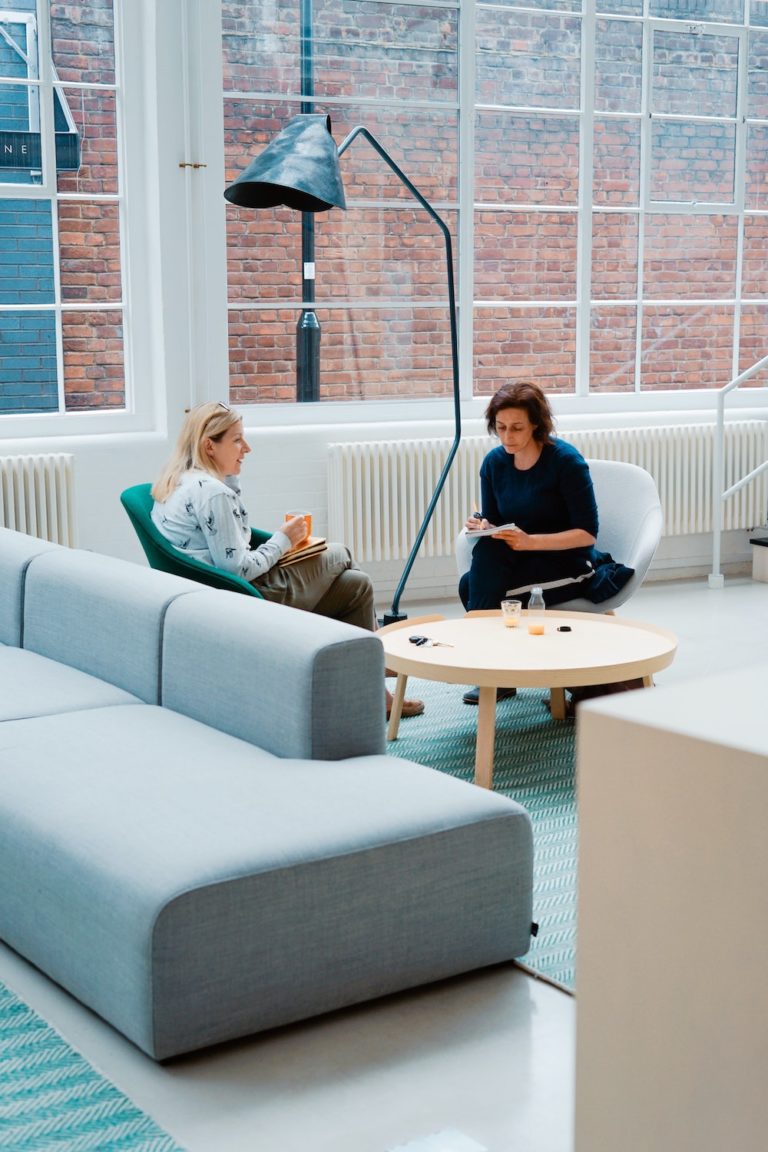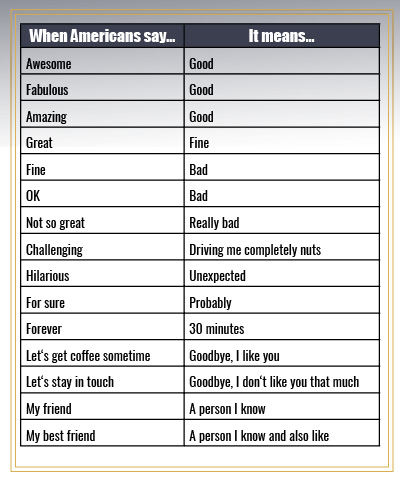
TOP 5 COMMUNICATION DIFFERENCES US VS. GERMANY
Living in the US as a German gives me the opportunity to observe many small differences throughout my day. In the following, I have written down 5 big communication-related habits that are very distinct in each country. It is always easy to become irritated by the behavior of other cultures. Please take in mind while reading that I don’t want to offend anyone and that there is no right or wrong but familiar and unfamiliar.
COMMUNICATION DIFFERENCE BETWEEN THE US & GERMANY NO 1
GERMANS DON'T LIKE TO BE LOUD
One fundamental difference between Americans and Germans is the volume in which they communicate their feelings and talk to each other. While Americans seem to be very self-confident, the Germans shy away from acting too noticeable. Often I realize this difference when going to a restaurant. For me and my other European friends, it’s sometimes hard to understand what the other person is trying to say as the background noise is unpleasantly high for what we are used to.
So far, none of my friends back home said that I have adopted the habit of speaking in a higher voice. Though let’s wait and see as raising your own voice is the only way to keep your conversation flowing.
COMMUNICATION DIFFERENCE BETWEEN THE US & GERMANY NO 2
THE USE AND MEANING OF COMFORTING PHRASES
Recently I came across a fittingly graphic that puts the difference in using specific adjectives and expressions into perspective. As you can see it is hard to evaluate a compliment or judgment if basic phrases are used that differently.
In the beginning, I enjoyed all the compliments I received when walking around the streets in the US. However, after some time abroad, you start to question how honest these compliments really are. Even the doctor in the medical practice will compliment you several times during treatment. Of course, you feel amazing and flattered at the beginning but after a while, you start to question these phrases and wonder if you interpreted all the small encounters in a totally wrong way. This also happened when I met new people and I thought we had a good time. For sure it was a learning curve to find out that „Let’s get a coffee sometime“ actually does not mean that you will ever see the person again. In my experience, it is just good to know about the differences so that you are not disappointed if the words are not followed by the anticipated action. As long as I am aware of these slight variations in meaning, I decided to enjoy the positive tone which accompanies you throughout the day.

COMMUNICATION DIFFERENCE BETWEEN THE US & GERMANY NO 3
THE WELCOME DANCE
After only a few hours in the US, you will immediately realize that there is a specific choreography for greeting people around you.
The dance normally starts with the person approaching you, asking how you are doing and you on the other side immediately respond with a smile that you are doing great, you thank for asking and of course, ask the other person back. It took me a while to take my time for this introduction. In my German efficiency, it just felt wired to say that many words when you just want to quickly pay for something in the supermarket or order a coffee. I always wondered how the other salesperson must feel like doing this all day long.
Hello! How do you do?
I am great, thank you. How are you?
I am great, thanks for asking. What can I do for you?
While I totally got used to this cultural habit, I met Germans with question marks in their eyes when doing this communication dance back in Germany. I did the mistake of greeting a German salesperson like that during my Christmas holidays and you can totally see the seconds of irritation this provokes. A German would not usually ask a strange person how they are doing unless there is already a certain connection or a specific interest. Moreover, we Germans would then wait for an honest, real-time answer and not the universal word „good“.
Your 3 months coaching program
Let’s get your journey started. I guide you through the jungle of question marks and give you the space you need to reflect and acknowledge your real career purpose.

COMMUNICATION DIFFERENCE BETWEEN THE US & GERMANY NO 4
THE PASSION FOR CHIT-CHAT
Americans are the best in making the most out of every second of waiting time. I love that you can actually still see that people look up from their phone starting to chit-chat with a random person about a random topic when queuing for something. I like the idea of making each others day just a bit brighter by sharing some thoughts although it’s mostly superficial.
For me as a foreigner it’s also a great way to get in contact with the locals and find out where they are coming from and where they are heading. It’s also a good source to get some really good recommendations for the next holiday and for sure I became an expert in talking about the really brutal weather in Chicago 🙂

COMMUNICATION DIFFERENCE BETWEEN THE US & GERMANY NO 4
Smartphone consumption
It’s still a fun fact for me that Americans don’t like to use WhatsApp but instead prefer the official text message provider. WhatsApp is seen as too secure and therefore criminals are said to use this messaging service. Really funny if you consider that there is a debate in Germany about whats app being not safe and data-sensitive enough 🙂
Besides that, the intensity of using the smartphone is also quite different. Everybody on the street is looking at their phone and everybody in the metro as well. While this is also evolving in Germany it’s still another level.
Moreover, you will often see couples and families sitting in the restaurant, eating while everybody is looking on their phone. Last time I checked back in Germany I have not seen that a lot and I hope it is nothing we will catch up with.
Also, businesses tend to use the phone in a more intense way to communicate with their customers. Without a social security number AND an American mobile number, you are stuck in so many different situations. Every provider and shop will ask you for your mobile number and it was crazy to find out that so many of them could not serve me, as the process did not allow me to move on without filling in a valid mobile number. Even in a lot of restaurants, the waiter won’t approach you anymore to tell you that your table is ready but you will receive a text message.
So, what do you think about my top 5 communication differences between the US and Germany? Of course, you could list so many more smaller and bigger things. However, these are my top 5 from my daily perspective.
Do you share my experience or want to add something? I am looking forward to exchanging in the comments below.











Eine Antwort
I really like the table of translations. Having lived in the US for about 30 years now, I still forget that people exaggerate so much.
A huge difference in communication in my experience is the questions!
In America, in any friendly conversation people will ask tons of questions about you. To a German that feels like getting grilled about your personal life by near strangers. Americans (are trying to) communicate interest in you by asking questions. By contrast Germans feel questions are too pushy and intrusive (unless they are coming from a close friend) and we try to invite sharing by going first and sharing something about ourselves that we think might get the other person to want to share something about them in response. It is an invitation to volunteer information, through volunteering information about oneself first. That is how interest is shown in German conversation and questions are considered rude, since they demand an answer the other might not be ready to give.
To American ears though this sounds like a person interested in themselves first. The combination of those two styles is disastrous: the American keeps asking, the German keeps talking about themselves… the American leaves thinking the German is not interested in them at all and the German leaves thinking the American is awfully nosey and disappointed that they’re being so secretive or reserved about themselves. This dynamic has been such a challenge for me and I’m afraid I still struggle with it.